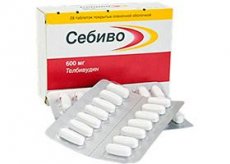Medical expert of the article
New publications
Preparations
Sebivo
Last reviewed: 03.07.2025

All iLive content is medically reviewed or fact checked to ensure as much factual accuracy as possible.
We have strict sourcing guidelines and only link to reputable media sites, academic research institutions and, whenever possible, medically peer reviewed studies. Note that the numbers in parentheses ([1], [2], etc.) are clickable links to these studies.
If you feel that any of our content is inaccurate, out-of-date, or otherwise questionable, please select it and press Ctrl + Enter.

Sebivo is an antiviral drug. Let's consider the main indications for its use, pharmacotherapeutic properties, dosage, side effects.
The drug is active against the hepatitis B virus. This viral disease is characterized by damage to the liver tissue and a pronounced inflammatory process. The disease is transmitted by harmful microorganisms from person to person. Hepatitis B has an acute course, which, with proper treatment, ends in recovery. Otherwise, the pathology becomes chronic and can cause death.
Indications Sebivo
The main indications for the use of Sebivo are the treatment of chronic hepatitis B. The drug is prescribed to adult patients with confirmed viral replication and an active inflammatory process in the liver.
 [ 1 ]
[ 1 ]
Release form
Sebivo is available in tablet form. The tablets are coated with an enteric coating, are white and oval. Each capsule contains 600 mg of the active ingredient - telbivudine. The excipients are: microcrystalline cellulose, povidone, sodium carboxymethyl starch, magnesium stearate, colloidal silicon dioxide anhydrous. The drug is available in cardboard packages of 14 pieces in one blister.
 [ 2 ]
[ 2 ]
Pharmacodynamics
The active substance of Sebivo is telbivudine. The pharmacodynamics of the drug is based on the activity of this component against the infectious agent. Telbivudine is a synthetic analogue of the nucleoside thymidine. It acts on the DNA polymerase of the hepatitis B virus. It is actively phosphorylated by cellular kinases, reaching an active triphosphate form with an intracellular half-life of about 14 hours.
Pharmacokinetics
The process of absorption, distribution, metabolism and excretion is pharmacokinetics. After taking a single dose of telbivudine in 600 mg, complete absorption is observed. The maximum concentration in the blood plasma is achieved two hours after administration. Constant concentration in the blood serum develops within 5-7 days of regular use of tablets. Absorption and systemic action do not depend on food intake. Binding to plasma proteins is low. Distribution by tissues and organs is equal.
After reaching the maximum concentration, the half-life begins, which lasts 40-49 hours. Telbivudine is excreted unchanged in the urine. About 42% of a single dose is excreted within 7 days.
 [ 5 ]
[ 5 ]
Dosing and administration
For the treatment and prevention of chronic hepatitis B, it is recommended to use 600 mg of Sebivo. The method of administration and doses depend on the severity of the pathological process, therefore they are prescribed by the attending physician, for each patient individually. If the drug is prescribed to patients who are on hemodialysis, then the tablets are taken after the procedure. The course of treatment depends on the results of therapy in the first days of its implementation.
Use Sebivo during pregnancy
There are no clinical data on the safety of Sebivo during pregnancy. The drug can be used only if the expected benefit to the mother is higher than the potential risks to the fetus. The drug is also not recommended during breastfeeding.
Contraindications
Sebivo has the following contraindications for use:
- Patients are under 18 years of age.
- Pregnancy and lactation.
- Individual intolerance to the components of the product.
The drug is prescribed with special caution to patients with impaired renal and hepatic function, after liver transplantation, and for people over 65 years of age.
Side effects Sebivo
If Sebivo is not used correctly, various adverse reactions may develop. Side effects are most often manifested by the following symptoms:
- Headaches and dizziness.
- Paresthesia.
- Cough and respiratory failure.
- Nausea, abdominal pain, bowel disturbances.
- Skin allergic reactions.
- Muscle spasms and pain in the side.
- Increased fatigue.
In some patients, severe cases of exacerbation of hepatitis B were observed after stopping the drug.
Interactions with other drugs
Very often, a complex of different medications is used to treat chronic hepatitis B. Interactions with other drugs should be strictly controlled. Sebivo is excreted mainly by the kidneys, so when taken simultaneously with drugs that affect kidney function, the concentration of telbivudine may increase.
The pharmacokinetic properties of the drug do not change when used with Lamivudine, Dipivoxil, Peginterferon-alpha 2a or Cyclosporine. Sebivo is not recommended for use simultaneously with Interferon alpha. With monotherapy with nucleoside/nucleotide analogues of the drug or when combined with antiretroviral agents, severe hepatomegaly with steatosis or lactic acidosis may develop.
Storage conditions
According to storage conditions, tablets must be kept in a place protected from sunlight, moisture and inaccessible to children. The storage temperature should not exceed 30°C. Failure to comply with these recommendations leads to premature deterioration of the medication.
Shelf life
Sebivo can be used for 36 months from the date of manufacture. The expiration date is indicated on the cardboard packaging of the drug and the blister with tablets. After this period, it is not recommended to take the tablets.
Attention!
To simplify the perception of information, this instruction for use of the drug "Sebivo" translated and presented in a special form on the basis of the official instructions for medical use of the drug. Before use read the annotation that came directly to medicines.
Description provided for informational purposes and is not a guide to self-healing. The need for this drug, the purpose of the treatment regimen, methods and dose of the drug is determined solely by the attending physician. Self-medication is dangerous for your health.

